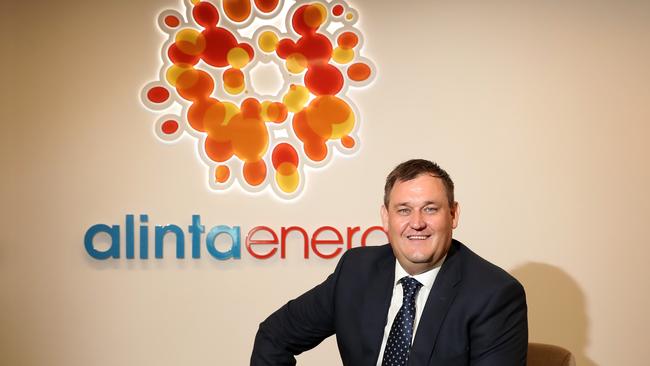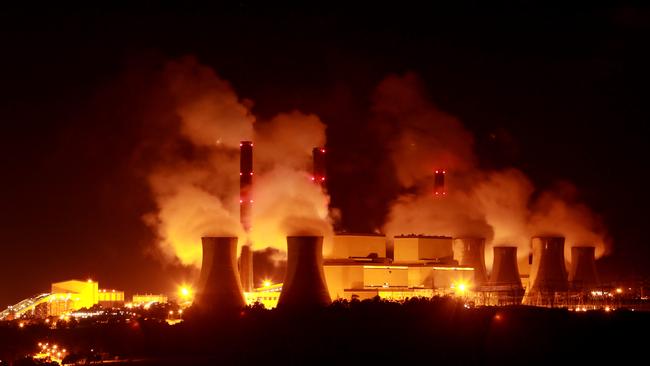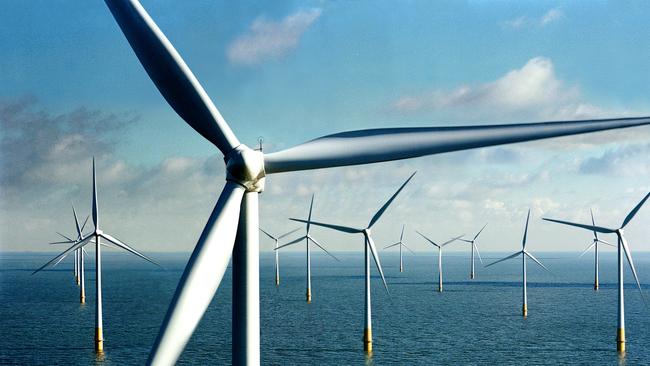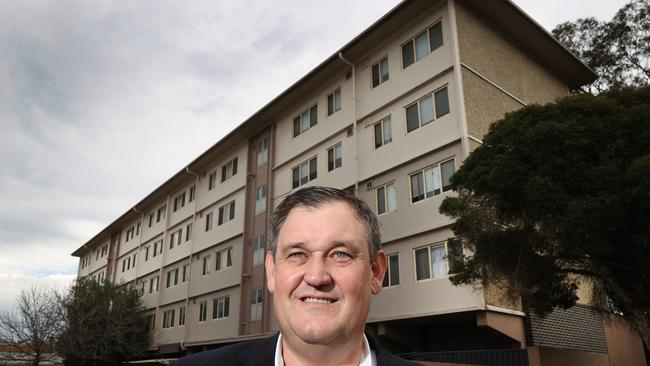Alinta Energy CEO Jeff Dimery reveals his plans for Australia to keep the lights on
He’s not a climate change evangelist but Alinta Energy boss Jeff Dimery sees a renewable future with affordable power. Here’s why.
Environment
Don't miss out on the headlines from Environment. Followed categories will be added to My News.
As Alinta Energy’s Jeff Dimery puts it, Australia’s energy transition is a “revolution”. Like all societal upheavals, no one really knows how it will play and where it will end.
Yet Dimery boldly differs from many of the loudest voices in the energy transition debate. He says that energy should not be mistaken for a religion.
Instead, he argues that the lights cannot go out. He says that energy is an essential service which has to be affordable to all Australians.
Dimery, at 54, presents as a face of the future, given his bounding forays into the renewable promises of tomorrow.
Yet for now, he also shoulders the shrillest of criticisms as a self-styled voice of energy reason.
He says renewables are a good thing. Of course they are. But are they to be encouraged – at any cost – so that they become 100 per cent of the supply?
“And that’s where I drop off from a religious point of view,” he says. “And I say, well, let’s be pragmatic. Let’s be practical.”
He winces at his label as the “Coal Guy”. Why not the “Renewables Guy”, Dimery asks, given he has backed that sector for decades, including 12 years as the head of Alinta, which has invested billions of dollars in wind, batteries and hydro?

In the quest for answers, where politicians set targets and believers genuflect to visions, Dimery could be confused as both a good and bad guy.
He is not imbued with fervour. He doesn’t aim to preach to the unconverted, but he will call out prescribed destinations – “agree to disagree”, as he says - when the journeys seem unmapped.
He answers to shareholders of a company which seeks to profit from old, new and emerging technologies.
His is a sober voice in the din. He speaks plainly, as if in tribute to his impoverished beginnings, when the cost of the family power bill helped determine what kind of food, and how much, would be on the table each night.
Click here to find all the stories in Future Energy campaign
Dimery prefers to ponder what is, and what may be, instead of reaching for judgier measures of good or bad, right or wrong or, indeed, Right or Left.
He is well-placed to fret about the future of this essential service in Australia. He bows to data and dollars, not dreams and distractions. And he identifies hard-headed conclusions which prioritise energy realities ahead of populist ideals.
When Dimery speaks of coal, for example, he is not throwing back to a yesteryear when fossil fuels were cheap, reliable and unquestioned. He is thinking ahead to a medium-term future and the need to keep warm in winter.

Dimery long ago embraced the challenge of climate change. He has been investing in renewables since then Prime Minister John Howard set a 2 per cent target increase (yes, 2 per cent) more than two decades ago.
Critics could try to dismiss Dimery as a ghost of the past, given his historical oversight of coal-fired power stations, and his warning that Alinta’s Loy Yang B plant, in Victoria’s Latrobe Valley, will probably need to run longer than our political masters would like to think.
That’s why he is the “Coal Guy” – which he calls “very unfair”.
For Dimery could also be the “Gas Guy”, given his belief that gas has “a really important role to play in the energy mix for probably the next two to three decades”.
He could also be the “Hydro Guy”, for overseeing what was at the time the biggest hydro power project for generations, as well as developing the Oven Mountain pumped hydro energy storage project in NSW.
Or why not the “Battery Guy”, given Alinta’s multiple projects?
Yet he is hardly isolated when he argues that the federal government’s 80 per cent renewables target by 2030 looks to be jeopardised.
There is no “perfect solution” to increasing costs, supply chain bottlenecks, skilled labour shortages, as well as the very predictable revolt by farmers asked to forfeit their lands for transmission lines.
“If you could do it with renewables, the preference would be let’s do it with renewables,” he says. “But I can’t be convinced that economically and from a social licence perspective, we actually can.”
He says all energy alternatives need to be considered – yes, that includes nuclear. In 2050, Australia’s emissions are set to be net zero. To be achieved, Australia must build seven times the renewables capacity of what has been built since a market opened to renewables in 2000, in a goal he describes as “challenging”.
Only one of two existing technologies stand to be the predominant source – nuclear power or offshore wind.
Alinta has no investments in nuclear, which is currently banned in Australia in a policy divide which neatly slices the left and right of politics.
Dimery lists the pluses of nuclear, which is reliable, beyond nature’s quirks of weather and would bypass disruptions around transmission.
But, in truth, he prefers to wear his “Wind Guy” hat.

Alinta wants to build off-shore wind farms near Portland in Victoria, in $6bn-plus plans which would supply the state with 10 per cent of its electricity needs. Called Spinifex, it is a signature project for the company’s “Big Bets, No Regrets” messaging.
The timeline is dizzying, given the policy, environmental and logistical hurdles. There are the whales, the Indigenous concerns, and the aesthetic questions posed by locals. And remember, as Dimery says, that Australia is in a “global arms race”.
The rest of the world faces the same energy challenges. Other places seek the same very finite supply of expertise and wherewithal.
“Everybody’s competing for equipment,” he says. “For instance, if you want to install offshore wind then you need ships that have the capability to drive towers into the Earth’s bed and cement them down.
“There’s not a lot of them around. When the US is putting up attractive subsidies, well, guess where the ships are going?”
Dimery’s unvarnished candour – and his stated ethos that material things are nice, but not necessary – stems from childhood.
He was about eight when he saw his father on the street in Port Melbourne. His father had left his wife and six children when Dimery was three.
On this day, his father saw his youngest child, Dimery believes, and kept on walking. The son calls his father’s refusal to engage a “f--k you moment”.

He was raised in a highrise housing commission unit, at or below the poverty line. Dimery ate a lot of potatoes. Potatoes were cheap.
His Mum washed, cleaned and cooked in working three jobs. She visited the market late in the day to buy the heavily discounted meat.
Dimery is wealthy now. He owns (and bets on) racehorses, lives in South Yarra in Melbourne, a father who dotes on his two adult kids and second wife Nicole. And to this day, the way his mother shouldered the everyday pressures of his childhood is “beyond me”.
He never felt like he was missing out, even if he was sentenced to the raging realities of domestic violence and the drug-use of housing commission neighbours from the start.
He left school early. He needed a job – any job – and started in a call centre for Melbourne Water.
What followed was a stepping stone march to energy (and a fortunate succession of inspiring male role models), feathered by his choice to finish year 12, then study economics and finance at RMIT.
He wasn’t aspiring to nation-building dialogues and billion-dollar deals. He just thought he could do more.
“I wouldn’t swap my childhood with anyone for anything,” he says.
“We didn’t have material things but we were close-knit family.
“I’m in a fortunate position. I can travel and see the world and that means a lot to me. I’m happier drinking Carlton Draught than some new-fangled boutique brewery beer that costs three times as much.
“I’m a simple guy with pretty simple needs… I’m just an energy guy at the end of the day.”
Originally published as Alinta Energy CEO Jeff Dimery reveals his plans for Australia to keep the lights on
Read related topics:Future Energy



